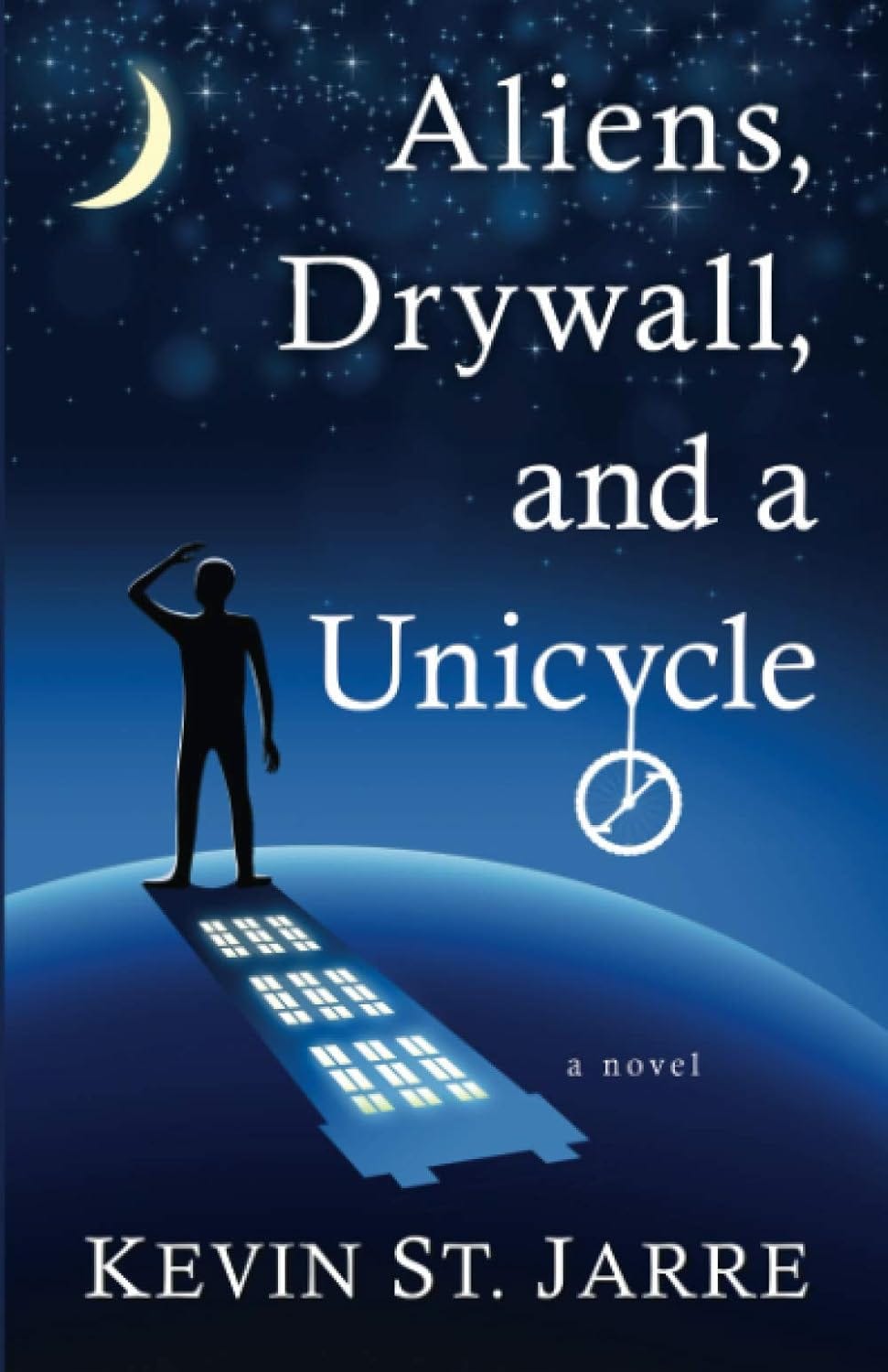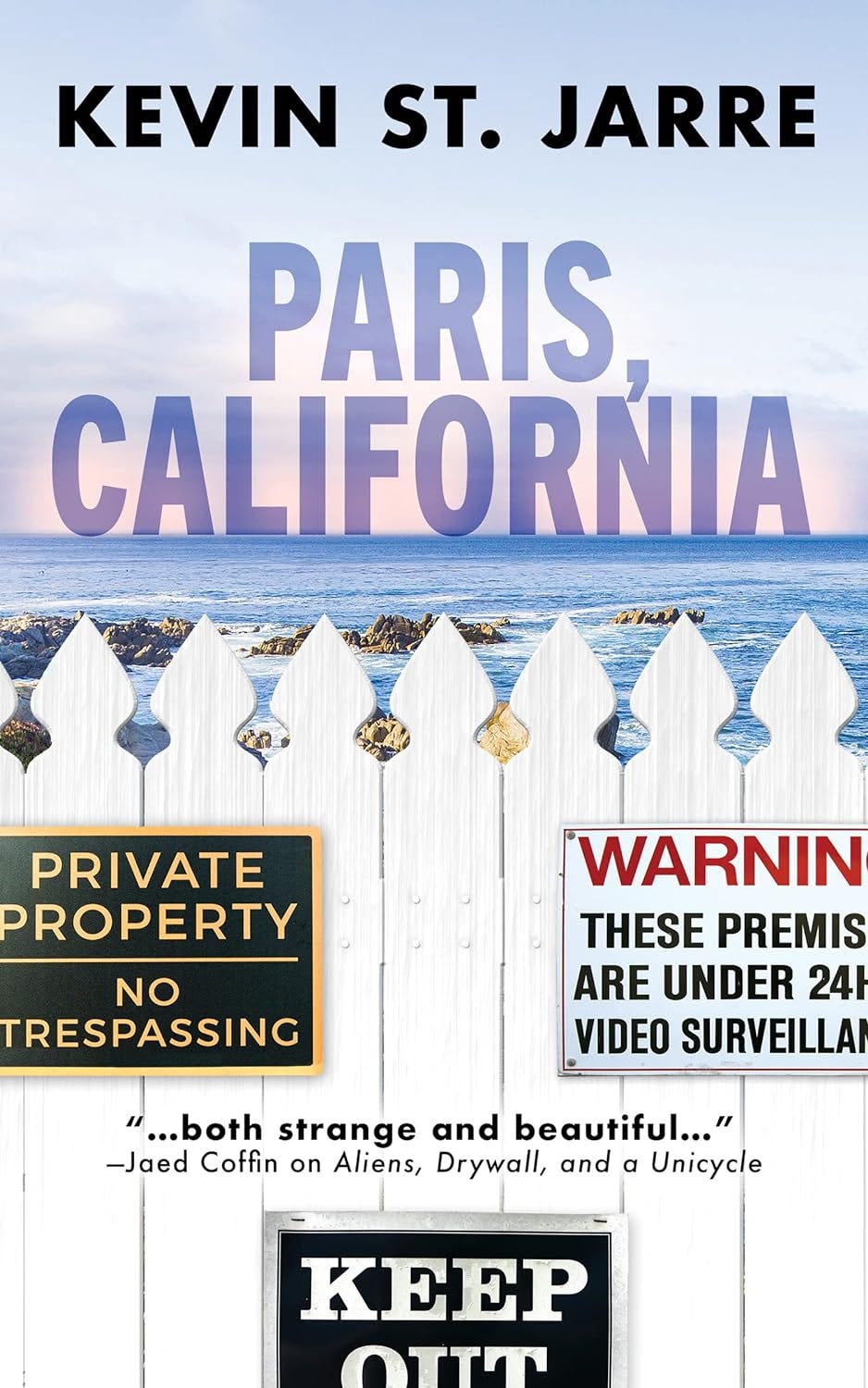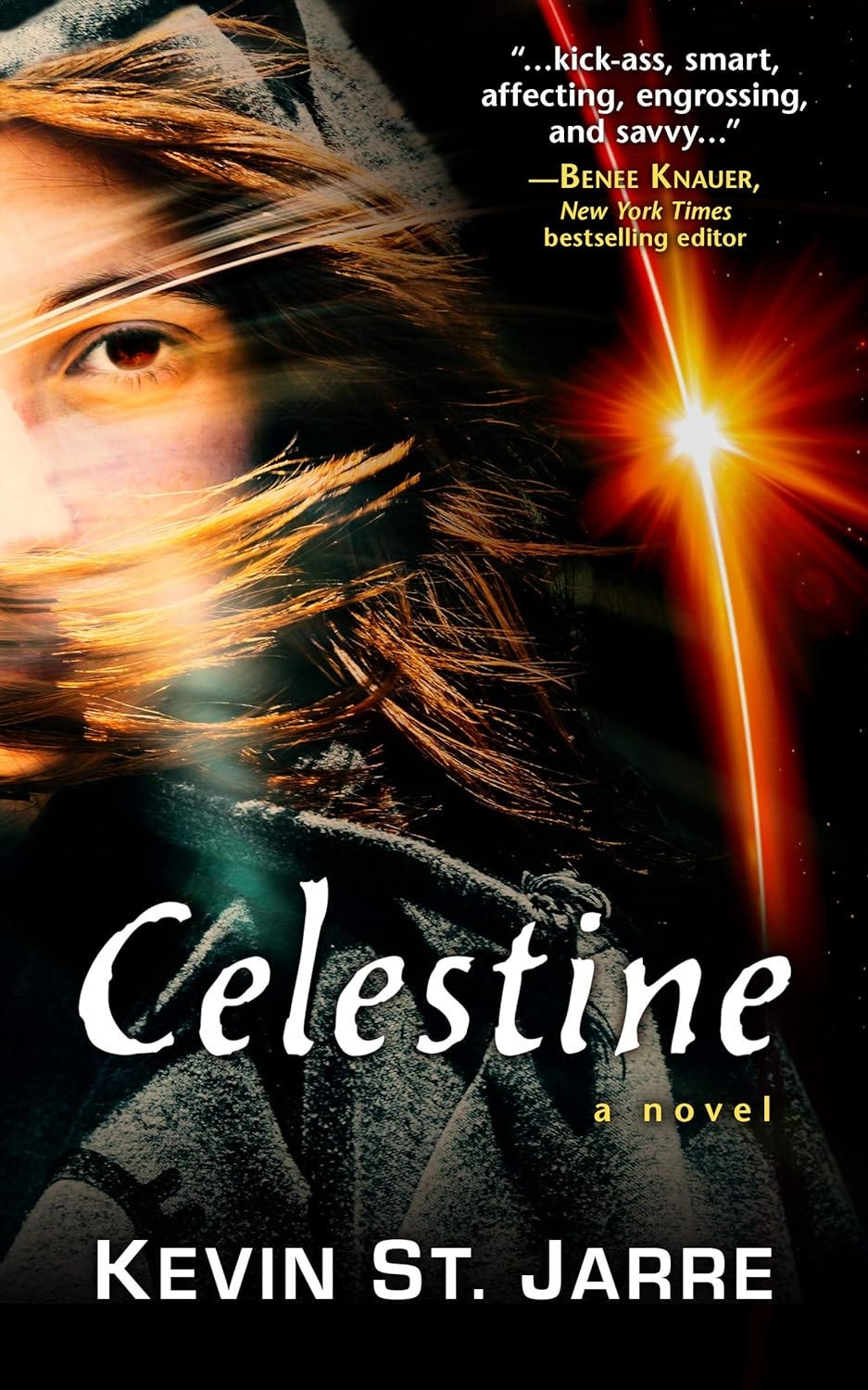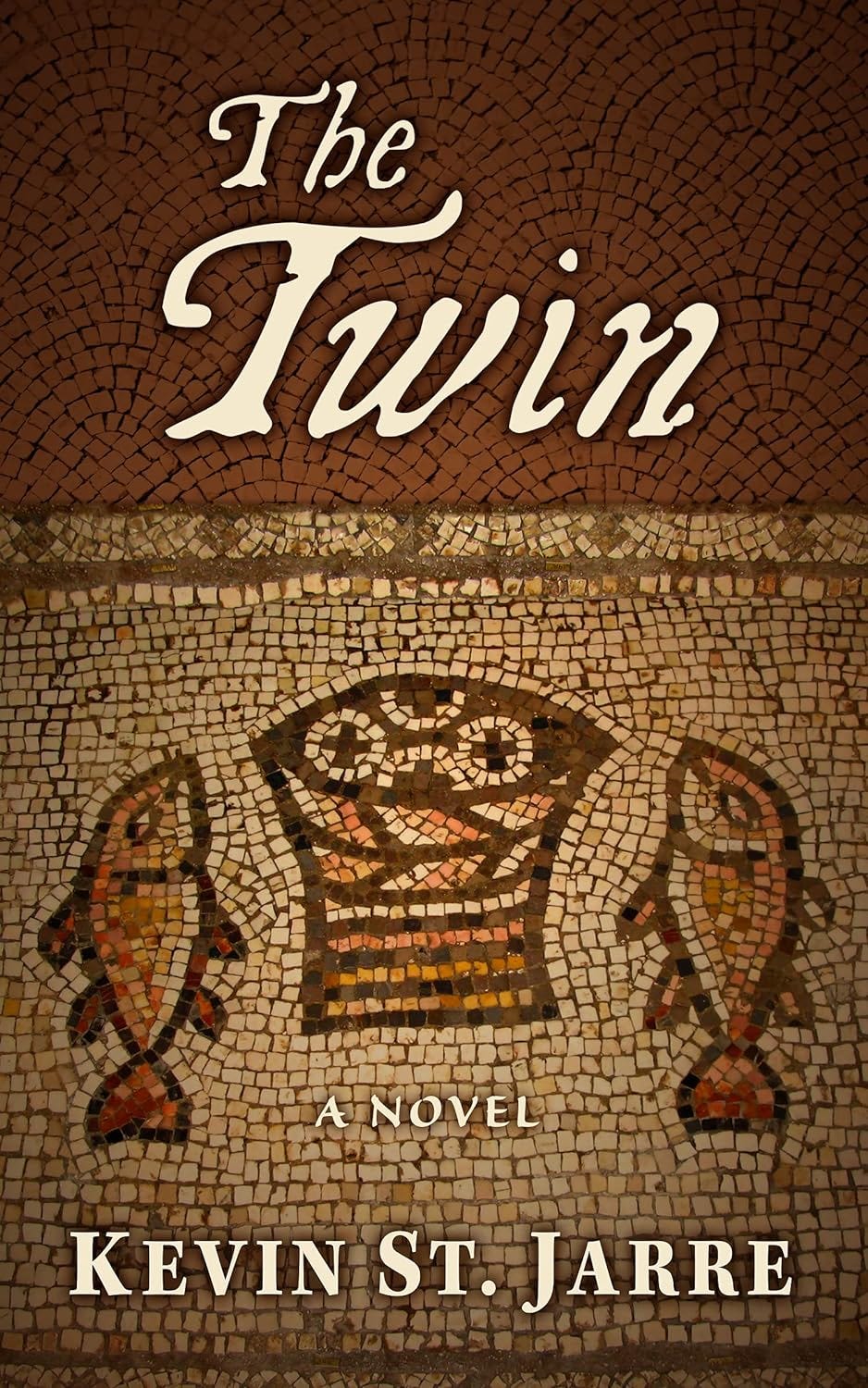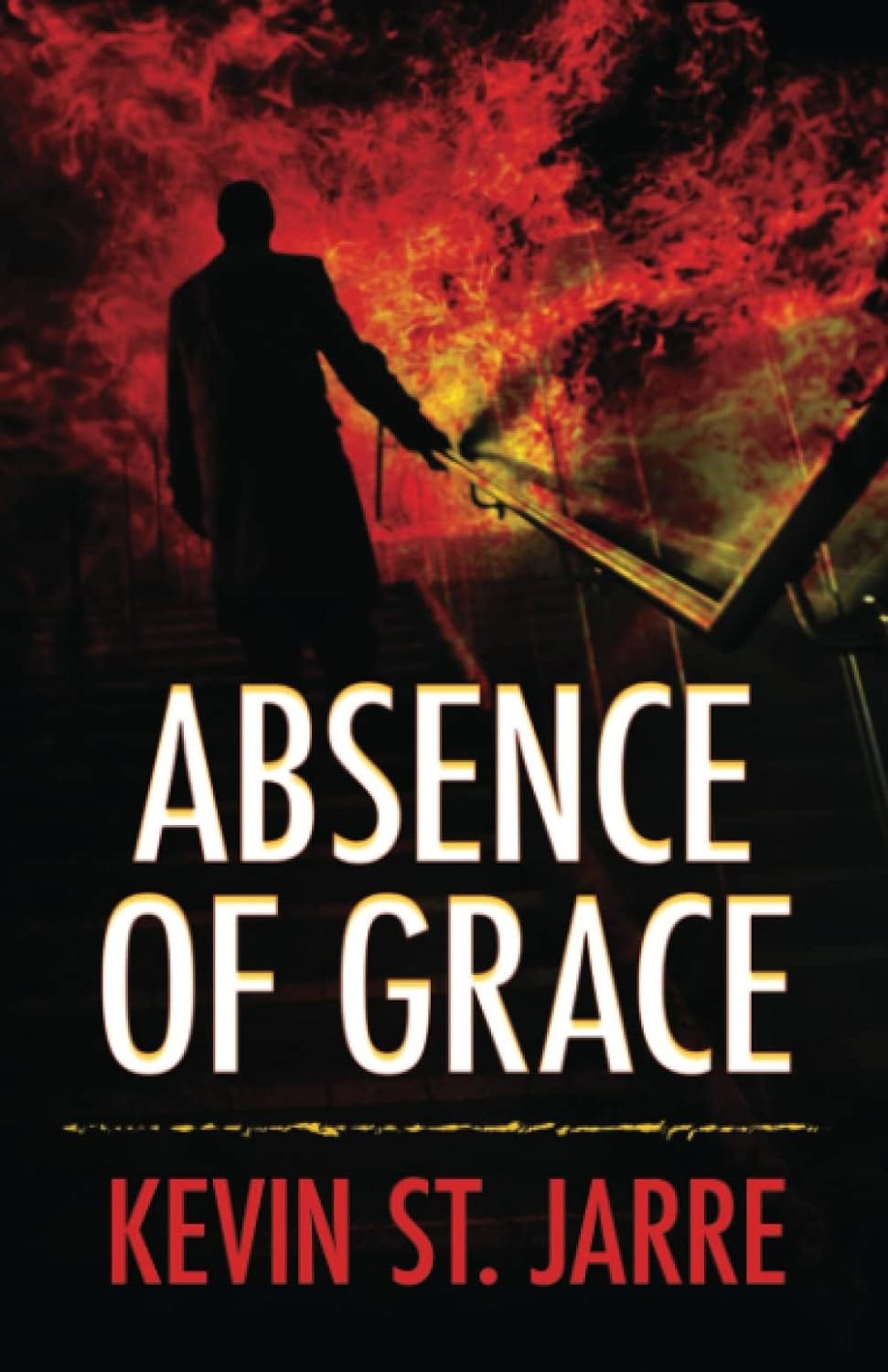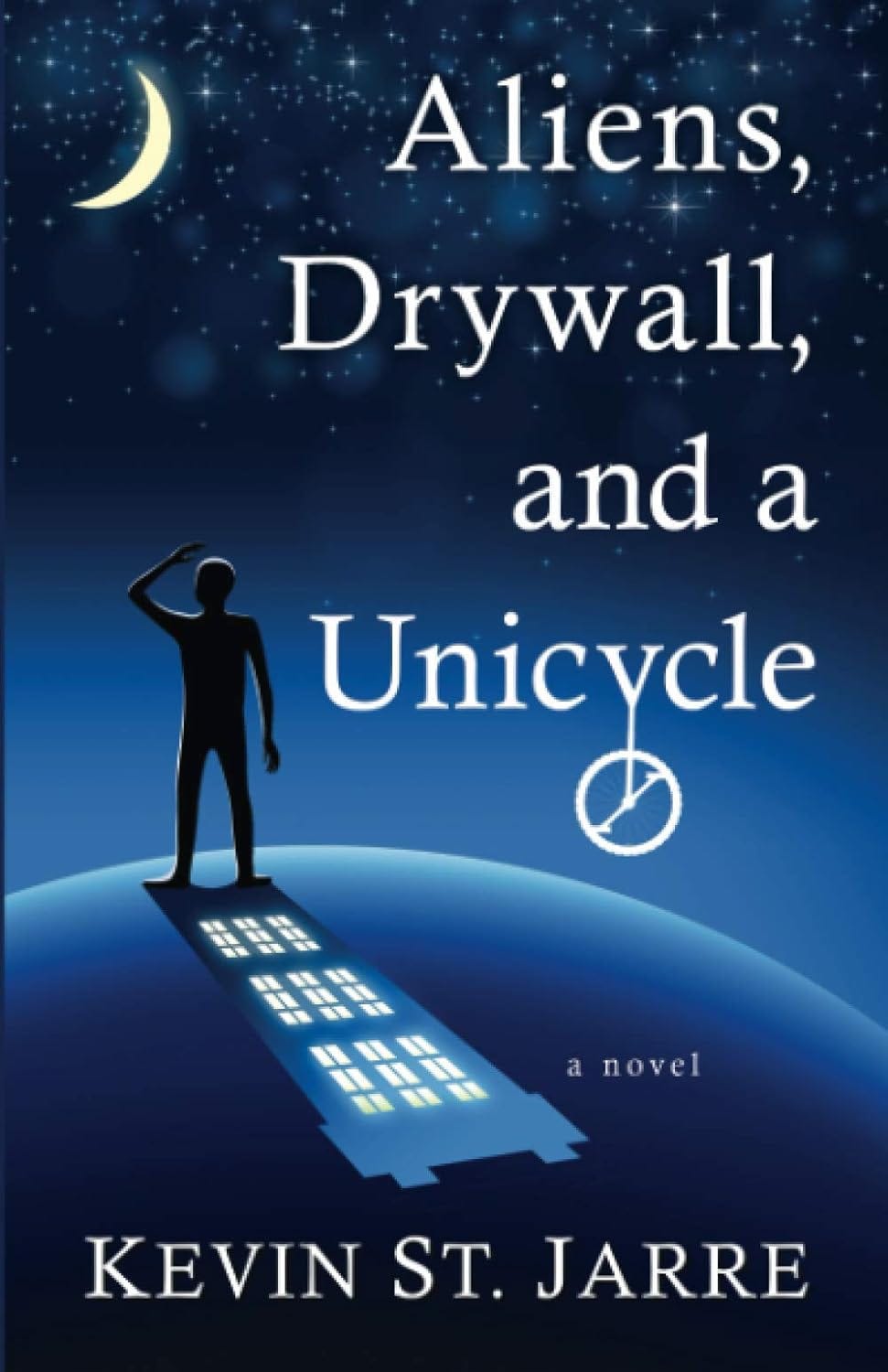Interview with Kevin St. Jarre - 2024
(Contemporary Fiction, Literary Fiction, Social Commentary)
Kevin St. Jarre's most recent novels were published by Encircle Publications: Aliens, Drywall, and a Unicycle, and Celestine, The Twin, Absence of Grace, The Book of Emmaus, and Paris, California. He is also a published poet, an essayist, and his Pushcart-nominated short fiction has appeared in journals such as Story and Solstice Literary Magazine. He earned an MFA from the Stonecoast program, has worked as a teacher and professor, a newspaper reporter, and a global corporate consultant. Kevin is a dual American and Canadian citizen. He lives on the coast of Maine.
Randal Eldon Greene: Hello, Kevin St. Jarre.
Aliens, Drywall, and a Unicycle is a novel about a reporter, Tom Tibbets, who is starting fresh with a new job in a small New Hampshire town. He ends up being assigned the task of writing up human interest pieces—what his boss calls refrigerator news. He’s assigned to write about his quirky neighbors in the Cooper Apartments. Though hesitant, Tom takes on the task.
You have a background as a reporter. Were you ever assigned “refrigerator news” like this?
Kevin St. Jarre: I've worked at two weekly newspapers. It was at the first that the publisher himself explained that what they printed was refrigerator news. It turned out to not be as restrictive as he made it sound. In the first year, I interviewed people who perpetrated a home invasion, covered a marijuana seizure of some 2,000 plants, and wrote the timeline leading up to a murder that was used by prosecutors in court.
Randal Eldon Greene: What I found interesting is that you set up your novel with a formula where Tom goes from resident to resident, and we readers learn about their lives through his interviews. However, you don’t end up taking such an easy route. You jostle things up before he can get terribly far into his interviews. Was your initial intention to have Tom interview the occupants of the other eight apartments one by one? Or did you always intend to start with the formulaic just so you could break it?
Kevin St. Jarre: The sequence of interviews represents Tom as he thought things would go. His plan coming off the rails is part of his realization that his predictable life was becoming less so, and that he wasn't in control of his own story as much as he would've thought.
His first assignment was a series of features. Not a drug bust, not local politics, and not even a ribbon cutting. Instead, a series . . . on his neighbors
Randal Eldon Greene: The title of the book comes from the quirks of three of Tom’s neighbors. Could you explain each part of the title for us?
Kevin St. Jarre: The title actually began as a placeholder. Originally, I was using "Aliens, Drywall, a Unicycle, and God" but then it became simply ADU. When I write fiction, I consider the titles to be temporary because typically publishers want a say in titles. In poetry, the title is part of the actual poem. In book-length fiction, the title is part of the novel to the author but part of the marketing to the publisher. In this case, I grew to like the title, and the publisher did as well. The pieces are from Marie's belief that we are all descendants of aliens, which is eccentric, the brothers hang drywall, which is mundane, and Miguel on his unicycle is an innocent free spirit. The only downside of this title was that some readers expected it to be sci-fi.
Randal Eldon Greene: His upstairs neighbor is a very disturbed character named Brynn. She cuts herself, has attempted suicide multiple times and will try to do so again during the course of the novel. She quickly develops an intense relationship with Tom, though it’s not the romantic and sexual one hinted at during their first couple of encounters. Could you explain how you view their close and problematic relationship?
Kevin St. Jarre: Tom thinks his superpower is that he believes he can read people's true intentions, that he can't be fooled, and that he simply knows the cynical truth about everything. Brynn thinks her power comes from her sexual attractiveness, and by provoking extreme emotional reactions in others. When Brynn shows that she is someone that Tom cannot predict, nor can he reveal her own "real" truth to her, he realizes that she is out of the reach of his superpower. When Tom proves to be immune to her overt flirting, and more practical than panicked by her provocations like drinking bleach, she realizes that Tom is different than most people she deals with. I think they see each other as seated around the same table, and that everyone else is on the table.
Randal Eldon Greene: While Tom is a bit annoyed about his feature-of-the-week assignment, he ends up wanting to write an in-depth story on Brynn. He has an interesting conversation with his boss and coworker about the potential of doing a longer piece on Brynn. Tom believes that a story on her could help others suffering from major depression and mania, help those who cut and attention seek in destructive ways. The others at the paper are skeptical. One of their most potent worries, aside from sellability, is that a long piece on Brynn could cause copycat behavior.
Ben, another resident of the Cooper Apartments, also raises concerns about Tom doing a feature on Brynn. He says, “She wants you to get her story down, so no matter what happens to her, she’ll live on? . . . Isn’t that dangerous . . . won’t that be a green light for her to kill herself?” Tom points out that Brynn regularly attempts suicide now, but he doesn’t stop to consider how a feature might equal follow-through for Brynn.
It’s so complicated, this desire to help on Tom’s part. I’m curious what your novel is trying to say? Tom doesn’t provide good rebuttals to these concerns. Do we censor true stories because it might harm someone in some way? What if those potentially harmful stories might help many more people than they hurt?
Kevin St. Jarre: Most people say they'd pull the lever in the trolley problem, but in actual fact, they'd rather never be presented with the problem in the first place. If someone says, "But if you don't pull the lever, 5 people will die," the only rebuttal is, "Yes, but if I pull the lever, 1 person will still die. If I don't pull the lever, no action of mine will cause death." Neither rebuttal feels great. I think Tom is fascinated by Brynn, and wants to learn more about her, and share that story. Secondarily, it might help others. However, I don't think he does the math, and comes to the conclusion that helping many while potentially sacrificing Brynn is worth it. He tries to distance himself from the responsibility of Brynn's potential death by pointing out that even before his proposed story, she's trying to kill herself. He'd rather avoid being put in the position that he's choosing the many over the one.
Randal Eldon Greene: That’s a fascinating juxtaposition with so many other characters in the novel. While Tom is willing to maybe sacrifice one for many, most characters are only thinking of themselves. They aren’t thinking about who they might harm, nor who they might help outside of themselves.
I’m thinking of Becky’s secret love life, the drywall brother’s self-serving hobby, and in a way Mr. Hitch’s isolation from his community of neighbors. Even Winnie, who I want to talk about next, eventually chooses to look after herself above anyone else.
But, again, the novel isn’t going to just let you have an easy answer to this theme. In some ways, Tom’s growth will require him to look inward and really think about himself. Yet, at the same time, the most dangerous and destructive elements of the novel stem from an overindulgence of this impulse. It’s almost like you’ve written a story that ruthlessly embodies the Yin and Yang notion of the seed of light being in the dark and the seed of dark being in the light.
Kevin St. Jarre: A pendulum isn't striving to swing. It's working to stop in the middle. The swinging isn't work; it's disturbance. The higher the swing, the bigger the problem.
Randal Eldon Greene: Winnie is an interesting character. She’s like an amalgam of many young women I knew back in my college days. Winnie gives a lot of clarity to Tom, as he points this out beautifully when he says, “She always did distill these things down.”
Kevin St. Jarre: She is an amalgam. These people, especially young women in my experience, who distill, but do so from a higher-altitude view. Their lives aren't perfect either, the act of holding themselves somewhat apart costs them in some ways. I've never met a Winnie who was a cutthroat corporate pirate, making 7-figures. Still, they provide a Glenda-the-Good-Witch sort of peace that is entrancing, and the opposite end of the spectrum from a Brynn.
Randal Eldon Greene: I found some very interesting nuances in your novel. While the book seems to champion the radical and the free-spirit in us, it challenges us by frequently twisting those same acts into violence and destruction. The “free love” lifestyle of Brynn leaves her stale and alone. An intergenerational romance with a beatnik veneer leaves a man hate-filled and heartbroken. The anarchic element of pure freedom breaks a whole community. It’s like, no matter how positive or negative your intentions, there may be bad outcomes. Or, if not wholly bad, at least mixed.
Kevin St. Jarre: When I was kid, we played on those sharp-edged, rusty merry-go-rounds in the playground. What one learns is that when it is spinning quickly, the excitement (and danger) is found at the edges. One also learns that if one is serious about staying on, one has to look, and sometimes move, to the center. The spinning doesn't stop, but the speed is lower, the centrifugal force is lower, and there is less screaming.
Randal Eldon Greene: Within your novel, there’s another book titled Tupac Was the Buddha. It’s a nonfiction manuscript which reads like a document written by an embittered, old soul. This unnamed author’s book comes across as a failed attempt at capturing the ethos of generation X; instead, it turns into a rant about how hard his generation worked and how awful the new Millennial generation is. In short, all it ends up doing is reproducing the tropes of cynicism and the “back in my day” mentality. Tupac Was the Buddha was a very sad part of the Aliens, Drywall, and a Unicycle; it was painful to read words of someone bristling with so much self-righteousness and abhorrence for the young, for change.
In many ways, this unpublished manuscript that Tom is reading is the antithesis of the extended dialogue he shares with Winnie. Winnie is a youthful free-spirit, and open and loving. She’s the total opposite of Tupac Was the Buddha, which implicitly asks Tom to hold tightly to generational trauma and anger, to value the workaday mentality that Tom will eventually rebel against.
In many ways I’d say this book is a tug-of-war between the lessons of the the Buddha and the lessons he learns from Winnie.
Kevin St. Jarre: Tupac was the Buddha is probably the most inappropriately titled manuscript. There's nothing Zen about it, there's nothing as cool as Tupac was in it, and the supposed wiseman who wrote it is nothing of the sort. While readers have written me, asking me to write the entire book separately, it is actually the coagulation of thoughts and feelings that Tom needs to escape if he wants to become a traveller like Winnie. A manual of "let me tell you what’s wrong" vs. a decision to let it go.
Randal Eldon Greene: I’m glad I took the time to really digest this book as a whole. I think at first I was reading the Tupac was the Buddha sections as some sort of ‘John Wayne saying it like it is’ thing. I think the misreading of intention with these sections by other readers may stem from you’re consistent ability to write what some may consider profound nuggets of truth. But then you take these nuggets and critique them, breaking them into their parts. For me, that’s the work of your novel! That’s the true profundity, the plot allowing for thematic exploration, question, and critique of pretty much any and all easy black and white pronouncements.
Kevin St. Jarre: There are no answers in the book. I feel more like a kid who likes to kick over old mossy logs, and then call to his friends, "Ewww, look a this!" which only leads to more questions.
“I don’t learn shit to impress people, man. It’s impossible to impress people, man. Even when people are impressed, it’s so fucking uncool to be impressed with anything that no one will admit it, you know?”
Randal Eldon Greene: I loved the character of Ben. This is probably because, like him, I worked fast food and was considered a bit intellectual by my peers, but we got along great for the most part. Ben is this polyglot who reads constantly. I truly couldn’t get enough of him and the way he talked with a terminal man ending many of his sentences. Is he partly based on yourself or on people you know?
Kevin St. Jarre: Ben is my favorite character. I'd love to say he is me, but I'm probably found in a lot of these characters. I also think that a pure Ben is the hardest to find in real life. I've even met more Mr. Hitchs than Bens. This is especially hard because many of us try to appear as Ben-like as possible. A Tom-Ben is trying to look less concerned and cynical. A Miguel-Ben is trying to keep up intellectually, or giving up when he can't go quite as deep. I've honestly considered writing a novel starring a Ben-like character, maybe on a roadtrip . . . but maybe it's been done.
Randal Eldon Greene: In Aliens, Drywall, and a Unicycle there is a love of kind of intellectualism which isn’t haughty or showy. I think this is best encapsulated when Ben states “I don’t learn shit to impress people, man. It’s impossible to impress people, man. Even when people are impressed, it’s so fucking uncool to be impressed with anything that no one will admit it, you know?”
It’s the conundrum of smart and talented people. What is all of it for? Even if you don’t intend to impress people, people will think that’s exactly what you’re trying to do. One option is to work fast food, like Ben. Hold an unimpressive position on the social ladder. Another option is to quit caring about appearances as if they matter. For Ben, it doesn’t matter if someone appears smart and poor or dumb and rich. Or vice versa—rich and smart, dumb and poor. He isn’t saying any of these things are good or bad; what he’s saying is that being satisfied with whatever it is you’ve got is what’s important, as long as it’s meeting your needs. I think it’s a mentality many could find beneficial!
Kevin St. Jarre: You've really nailed it. He's figured out how to simply chase ideas, without getting wrapped up in the judging others or worrying about others judging him. So many people claim they don't care what other people think, but it's a lie, even to themselves. Ben is different in that it's honest. He doesn't care what others think, and works at giving them no reason to struggle to figure him out. He simply exists, is growing intellectually and spiritually, and is happy. Of course, there is the one thing that basically throws that off-balance, as we see in the book, but why should Ben be impervious to what gets everyone else as well? Sometimes, being thrown off-balance by outside forces can be a good thing, and pop one out of a rut. Other times, it can kick a person off of the peaceful path.
Randal Eldon Greene: I have to ask about something in the Aliens, Drywall, and a Unicycle I assume must be a regional thing. There’s a part in the book where someone knocks at Tom’s door and then knocks again. Tom’s reaction isn’t to answer the door, but to think “Weird. Who knocks and then waits to enter?”
I’m thinking, well of course, everybody! You don’t knock and then just open someone’s door. That’s weird. This knocking etiquette comes up several times. Only in the most familiar of circumstances would people where I’m from (the Great Plains area) find this behavior acceptable. Are you making fun of Tom or, like I assumed, is this perhaps a regional etiquette difference?
Kevin St. Jarre: It may be regional. There is the factor of how well you know each other, but there is also a connection to what one is bringing. If someone is intending to bring a smile and fun, they are less likely to wait. If you're knocking because you've brought bad news, or need to have a tough conversation, one feels it more necessary to be invited in.
Randal Eldon Greene: Since aliens are a hot topic in the news of late, I’d love to ask, do you—like Marie— believe aliens regularly visit our planet?
Kevin St. Jarre: I hope this doesn't disappoint too many . . . I don't believe space aliens would bother coming here. The investment in resources in what must be a one-way trip due to time dilation makes it seem unlikely anyone would bother visiting Earth. I'm not down on our planet, like so many are, but if I gave you a free ticket to fly to one of two destinations—fly to New York City for a week of sightseeing, the theater, etc. OR fly to remote Oklahoma where they've discovered a mote of dust with a weird microscopic fungus on it—which would you pick? Earth is the dust mote, we are the fungus, and I can't see any lifeform capable of making the voyage being interested in doing so.
Randal Eldon Greene: Writing a book that deals with what some might call “big ideas” but at the same time telling an interesting story is not an easy novelistic task. What advice do you have for the writer who wants to write an “ideas” novel but who, of course, wishes to keep it from turning into a soapbox speech or pure polemic?
Kevin St. Jarre: Let the characters pick the ideas. If the author selects topics in advance, the book risks being a soapbox. If the author picks the characters, and then imagines what the topics would be as the dialogue is being written, it works better. It sounds corny, and I promise not to use the word "organic," but just wing it. If the character says something less than interesting, back up and give them another crack at it.
Randal Eldon Greene: What's it like writing and publishing in this day and age, and what are you writing now?
Kevin St. Jarre: You know, people always say that it's tougher writing and publishing today than it has been. I'd like to separate those two pieces. Part of the reason publishing has become more difficult, weirdly, is because the work of writing and submitting has become easier. I don't mean the art and craft of writing. I mean, for example, if I decide Chapter 14 should actually be Chapter 3, I cut and paste it in my word processor. I don't pull out my new ream of paper and start retyping the manuscript on my IBM Selectric III typewriter. Many people who wouldn't have gutted out the work in decades past, crank out book-length stuff now.
Next, we can query a number of agents or publishers simultaneously, and electronically. Twenty years ago, we were mailing, with postage stamps, our query letters. The wait time was much longer, and the work much more tedious. So, that sort of democratization of submissions has made life much harder on agents and editors who are now swamped, and there is more clutter to get through.
Also, the largest publishers slashed the number of junior editors they had, leaving the poor lit agents to be the gatekeepers on this new, digital tsunami of submissions. On top of everything else, even the best literary agents who have become, out of necessity, amazing judges of what will sell and won't are still surprised by publishers who won't bite on what would've been a sure-sale a year or two before.
Small publishers, whom many people still call indie publishers, are doing yeoman's work in the shadow of giant houses. The really reputable ones don't charge authors a cent, edit the manuscripts, make sure their books and covers are well-designed, and work through the effort to get those indie books widely distributed by Ingram and the like. They are a bright spot in publishing, but they are often not part of the inside circle of who-you-know that can get a book reviewed in a major outlet that will increase sales.
There is no end to the parallel industry that has cropped up to help authors "make it big." One can spend hundreds of dollars to get a review in a particular venue, but it seems that the real money lately in publishing comes to those willing to trade on hopes and dreams for cash, and not to the person who wrote the book.
I say all this as someone who isn't bitter in the least. This is the ecosystem we're in. Some think they avoid the whole thing by self-publishing. I say, "Go ahead." To each their own.
As far as the craft of writing goes, this has to be one of the most supportive eras. While there are those readers and writers alike, who seem to derive some joy by writing negative reviews, most are cheerleaders for the written word. There are so many ways to learn about the craft, even without spending money, and if one wants to extend their education at a university, there are many opportunities there as well. Writers groups used to be locals, with mixed genres, which are great, but now an author can find an international online group with whom to share, of any make-up and size.
One challenge with writing, and I think most writers say this, is finding the time. Most novelists I know cannot write in 15-minute snatches, here and there. They can't compose into a voice recorder while commuting. Several, contiguous hours at a time, sitting at the keyboard, are required, and often.
As for what I'm working on, my most recently completed novel, Chills at Her Living Cry, is looking for a home, and I'm currently writing the next one. It's a bit of different path for me, centered around a researcher in neuroanatomy, and the ghost of a scientist interested in his work. The working title is Empathy, but I'm sure that will change. I'm off to work on it right now.
Purchase Aliens, Drywall, and a Unicycle online.
© 2023
Thanks for reading Hello, Author! Subscribe for free to receive new posts and support my work.
About the interviewer:
Randal Eldon Greene is the author of Descriptions of Heaven, a novella about a linguist, a lake monster, and the looming shadow of death.
His Instagram is @RandalEldon Greene
His website is AuthorGreene.com
You can also support our work by buying cool merch like mugs and t-shirts.



